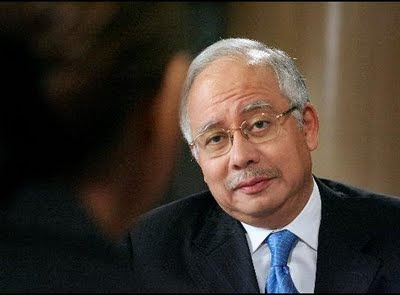KUALA LUMPUR, Sept 16 — Long past the retirement age, Datuk A. Samad
Said, or Pak Samad as he is more popularly known, has taken on a new
“job”.
Activist.
He famously took to the streets at the last two Bersih demonstration to
champion the cause of free and fair elections in Malaysia, a country
over three decades younger than him.
Describing himself as a man “nearing the grave”, the poet turned to
political activism to push for reforms, saying that there is “so much”
work for the country to do.
Pak Samad explained that he had simply joined Bersih 2.0 a few years
ago on the invitation of the polls reform group, coming out of his quiet
life that revolved around praying, reading and writing.
“I was living a calm life, then I was invited. And I believe this is a
good cause so I accepted the co-chairman (post) of Bersih,” the national
laureate told The Malay Mail Online recently.
“I should stay at home. I’m 81. But I feel responsible when people want
me to be active. I see the cause, I like the cause so I do whatever I
can for the benefit of society,” said the Singapore-born Pak Samad.
He became a Malaysian after setting foot in Malaya a few months before Independence.
He sees joining Bersih, which has organised three massive rallies for
electoral reform, in his late 70s as a way for him to work towards the
country’s harmony.
“Especially Bersih we want a clean government, we want a clean
election, and we want it to be fair. If the election is not fair, the
government will always be unfair,” he said.
This is not the first time he has made a drastic change in his life,
having decided to leave the world of journalism at the age of 49 to
write and give talks.
Pak Samad penned novels and poems and his literary efforts earned him
the National Laureate title in 1986, having been awarded the Pejuang
Sastera title after clinching the Southeast Asia Write Award in 1979.
But Pak Samad, who has a lifelong passion for books and words, has not
stopped writing, with his recent poems like Unggun Bersih becoming a
rallying cry for the public to act.
Pak Samad noted that what is seen as a career change is actually a
continuation of his efforts in his works to voice out and record his
dissatisfaction.
“I did that before in my writing. Whatever disturbs me, I put it into my novels, my drama, my essay.
“Now of course after being co-chairman of Bersih, it’s not only writing... I have to be
on the streets as well,” he said, saying it was initially exhausting for him to go out and meet people and join demonstrations.
“But I’m happy doing that,” he added, breaking into a smile under his
white beard; glad to be able to do something for the people.

The
sight of the frail white-haired and bearded man walking barefoot in the
Bersih rally on July 2011, determined to hand over a memorandum to the
palace, cemented Pak Samad’s image as the conscience of the country.
Although Pak Samad is now widely-regarded as a symbol of the people’s
movement, he gently said that others can easily fill his shoes and do
what he viewed as being quite an ordinary feat.
“I appreciate that. I think what I do many other people can do also.
It’s not something extraordinary. They think I’m doing something good,
I’m happy,” he said.
Pak Samad, who appears to be content letting others take the limelight,
said he usually does not speak, except for instances such as when he
defended Bersih 2.0 co-chairman Datuk Ambiga Sreenevasan against a group
of former army veterans performing a butt-dance.
“When some of these things happen, then I come in. But most of the
time, it’s Ambiga. It’s Ambiga who really gears up the thing, I’m just
helping,” he said.
When asked what he thinks of Malaysia turning 50, Pak Samad said that
the country now is not stable and mature, owing to politicians stirring
up racial issues to divide the people.
“We should have been a stable country, we should have been a harmonious
country and we shouldn’t end like what is being visualised by this
Tanda Putera, giving the impression that the Chinese are the enemies of
the country, which I think is wrong,” he said, referring to the
controversial local film which has been criticised for its allegedly
unfair depiction of the racial riots of May 13, 1969.
“Every race has given something to this country,” he added.
“We are still unstable because of the race issue which they try to
magnify unnecessarily,” he said, referring to the politicians who he
said tend to bring up racial issues during elections and pit Malaysians
against each other.
Pak Samad said Malaysia needs mature leaders with a vision of harmony,
accusing the leaders from the current administration of disregarding
harmony to keep their grip on power.
“It all depends on the leaders—what sort of country they want, what
sort of nation they want. It’s on the top, they have the power, they can
do it,
but the trouble is they dont want to do it because the most important thing is the power.
“If you can have the power by destroying a nation, they will do that.
Because the power is important, the nation is not important to them,” he
said.
“That’s why it’s your time now to make sure that this does not happen
by casting your vote for real leaders, sincere leaders, visionary
leaders, very caring leaders,” he said.
Pak Samad said Malaysians must learn to think as a nation, and not as
different races, citing the nation’s many decades of living together.
“We must work hard to make this country a harmonious country, just and
fair to all. And accept everyone who has been born here, educated here,
and work here; this is our nation, these are our people,” he said.
At 81 years old, Pak Samad said he wanted to be a writer when he was
growing up, but the devout Muslim now wants “a good place in heaven.”
He also said he has no heroes except for Islam’s Prophet Muhammad, but
pointed to DAP veteran leader Lim Kit Siang and DAP secretary-general
Lim Guan Eng as Malaysians he admires.
“Well, I admire Lim Kit Siang, I admire Guan Eng for what both of them
are doing for this country. I think we need leaders like them, very
sincere, very focused and have a vision of a good Malaysia, of a
prosperous Malaysia, a harmonious Malaysia. Unfortunately we have few
people like them,” he said of the DAP father-and-son duo who were once
jailed under the now-abolished Internal Security Act (ISA) 1960
Read more...



 KUALA LUMPUR:
Perdana Menteri, Datuk Seri Najib Razak hanya memotong RM1,698 elaun
keraiannya sebulan berbanding peruntukan berjumlah berbilion ringgit
untuk program-program berbentuk kempen politik, kata Pengarah Strategi
PKR, Rafizi Ramli (gambar).
KUALA LUMPUR:
Perdana Menteri, Datuk Seri Najib Razak hanya memotong RM1,698 elaun
keraiannya sebulan berbanding peruntukan berjumlah berbilion ringgit
untuk program-program berbentuk kempen politik, kata Pengarah Strategi
PKR, Rafizi Ramli (gambar). KUALA LUMPUR:
Populariti Perdana Menteri Datuk Seri Najib Razak (gambar) jatuh paling
rendah sejak memegang jawatan itu apabila ratingnya jatuh daripada 62%
Ogos lalu ke 52% pada bulan Disember ini, lapor kaji selidik yang dibuat
oleh Merdeka Centre.
KUALA LUMPUR:
Populariti Perdana Menteri Datuk Seri Najib Razak (gambar) jatuh paling
rendah sejak memegang jawatan itu apabila ratingnya jatuh daripada 62%
Ogos lalu ke 52% pada bulan Disember ini, lapor kaji selidik yang dibuat
oleh Merdeka Centre.












![Perang Dunia Ke-III,
Amerika Syarikat terlalu terdesak untuk menyerang Syria bukan kerana ingin membela rakyat Syria tetapi untuk melumpuhkan bulatan pejuang Islam yang sedang membela Palestine-Syria dan Mesir. Kekuatan umat Islam hari ini mengarah kepada kembalinya kesatuan yang digeruni seperti zaman Uthmaniah!
Amerika manipulasi fokus dunia kini apabila tragedi berdarah rampasan kuasa di Mesir dialih perhatian kepada tragedi senjata kimia di Syria. Amerika akan masuk sebagai polis dunia yang ingin membela dari kezaliman. AS perlu ubah perhatian dunia dari Egypt supaya tidak berlaku Arab Spring 2 yang sudah pasti berpotensi melumpuhkan Saudi-Qatar-Kuwait-Bahrain dan negara lain! Al-Azhar ingin ditumpulkan,Hamas dan Ikhwan Muslimin wajib dilenyapkan. Justeru jangan terkejut bila pemimpin Arab sendiri memberi laluan mudah merestui perancangan jahat ini.
Cumanya kehadiran AS dalam gelanggang perang Syria bukan seperti di Iraq dan Afghanistan lagi kerana Syria bakal membuka gelanggang pelbagai penjuru yang terlalu rumit lagi sengit. Perikatan Rusia-China & Iran mendokong Bashar Al-Asad dikala Amerika-Britain-Saudi & Israel berikrar musnahkan musuh yang mengancam mereka. Dipihak yang lain Turkey dan dahulunya Mesir tampil mempertahankan tanah ambiya ini bersama pejuang yang datang dari seluruh pelusuk dunia. Inilah perang Ahsab di zaman kita, zaman fitnah yang berleluasa dan pengakhir segala masa. Wallahualam
SANI ARABY AL-KAHERY
Pengarah Strategi MAPIM
[SHARE-LIKE-SUPPORT]](https://fbcdn-sphotos-e-a.akamaihd.net/hphotos-ak-prn1/p75x225/1234683_10200632001903901_1983548460_n.jpg)



















